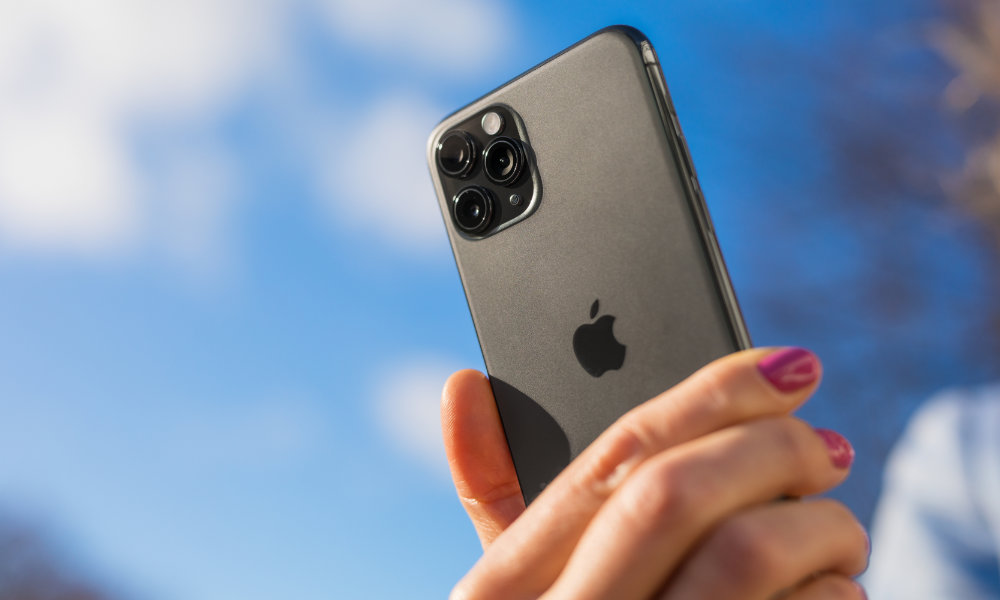Apple Explains Why You Can’t Stop Your iPhone 11 From Tracking Your Location, Promises Fix
 Credit: Kicking Studio / Shutterstock
Credit: Kicking Studio / Shutterstock
Toggle Dark Mode
Earlier this week, Apple admitted that its iPhone 11 models use location data even when all location privacy settings are switched off, after security researcher Brian Krebs discovered that his iPhone 11 Pro was displaying the location services indicator in the status bar even after he had switched off all of the location services options in the iOS Privacy settings on his device.
While Krebs originally assumed this was a bug, and reported it to Apple as such, he was surprised to be told that it was actually “expected behaviour” and that there were certain system services that could not be turned off except by disabling Location Services globally — an inconvenient approach for those who still want to use location services on-demand in specific apps without being at risk of background tracking.
The issue only seems to affect the iPhone 11 models; even with the latest version of iOS 13 installed, the iPhone XS, iPhone XR, and all previous models behave appropriately when all location services are disabled. This suggests that there was some “system service” specific to the iPhone 11 at work, and now Apple has provided further clarity pointing to one significant but oft-forgotten hardware difference in the new models: Ultra Wideband.
Apple added Ultra Wideband to this year’s iPhones with a new U1 chip, but while it promises a lot of future potential, including support for Apple’s much-rumoured AirTags, right now it’s easy to forget the U1 chip and Ultra Wideband radios are there because they really don’t do much — the only feature Apple has offered up for it so far is prioritizing AirDrops between iPhone 11 devices so that you can more easily send to the right person when you’re in a room full of iPhones.
However, it seems that Apple’s choice to add Ultra Wideband (UWB) meant that it needed to adhere to certain restrictions. In a statement that Apple finally gave to TechCrunch — after first pointedly declining to comment — Apple is required to disable UWB in certain locations, and therefore needs to use location services in the background to determine if it’s in one of these UWB-restricted areas.
Ultra wideband technology is an industry standard technology and is subject to international regulatory requirements that require it to be turned off in certain locations. iOS uses Location Services to help determine if an iPhone is in these prohibited locations in order to disable ultra wideband and comply with regulations.
Apple spokesperson, in a statement to TechCrunch
Most importantly, however, Apple emphasized that it’s not actually sending this location data anywhere, but simply processing it on device to determine if the UWB transceivers should be disabled. As TechCrunch notes, this seems to line up with what other security researchers have found, or more to the point, what they haven’t found — there’s no evidence that any location data is being sent out from the iPhone in this scenario. Further, if the stated purpose of the location tracking is accurate, there would really be no reason for Apple to actually collect this data.
How to Turn It off
As researchers have discovered, and Apple has confirmed, there’s no way to disable this location feature right now, although by all analyses only the most extremely privacy conscious (read: paranoid) users are likely to care too much. Apple has promised that the data isn’t going anywhere, and even if you find its statements suspect, several security researchers have confirmed that they can’t find evidence of any location data leaving the device.
That said, Apple told TechCrunch that it will be providing a new “dedicated toggle option” in an upcoming iOS update to let users turn the feature off. It’s unclear how this will be implemented, however, since if Apple’s statements about needing to disable UWB in certain geographic areas are true, it seems likely that the only option will be to allow users to disable UWB entirely. Of course, this may not be a bad thing, since users who are sensitive enough to location tracking to be concerned about this issue will probably welcome the ability to disable UWB as well, since this eliminates another way — albeit a very theoretical one — in which an individual iPhone can be tracked.
Apple’s Deafening Silence
What’s particularly troubling about this situation, however, is that it took Apple as long as it did to come up with a response. Several security researchers and reputable members of the press, including TechCrunch’s Zack Whittaker, found themselves stonewalled when they reached out to Apple for clarification, with no explanations forthcoming beyond it being “expected behaviour” — an answer that isn’t particularly reassuring with all of the big tech privacy scandals that we’ve seen in recent months.
The simplest explanation is that because Apple is a large and very compartmentalized organization, its normal PR people likely didn’t have an answer readily available, so they fell back on the standard “no comment” while they attempted to find the people in the engineering teams who would be able to explain why this was happening.
Apple makes a lot of noise about taking user privacy seriously, and by all reports it does a much better job than most other big tech, but it also hasn’t been totally free from its own scandals, and it should definitely be doing as much as it can to reassure users when issues like this come up. As TechCrunch notes, Apple’s delayed response welcomed needless speculation that fuelled paranoia, which ultimately made this a far bigger issue than it needed to be.






